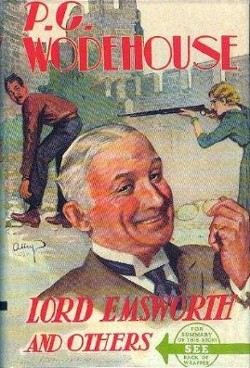
Lord Emsworth and Others is a collection of nine short stories by P. G. Wodehouse, first published in the United Kingdom on 19 March 1937 by Herbert Jenkins, London; it was not published in the United States. The Crime Wave at Blandings, which was published on 25 June 1937 by Doubleday, Doran, New York, is a very different collection, sharing only three of its seven titles with the UK book. Penguin Books published a UK edition of The Crime Wave at Blandings in 1966. The stories in both books had all previously appeared in both British and American magazines.
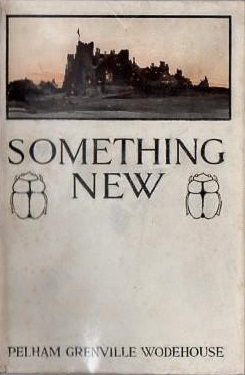
Something Fresh is a novel by P. G. Wodehouse, first published as "Something New" in the United States, by D. Appleton & Company on 3 September 1915. It was published in the United Kingdom as "Something Fresh" by Methuen & Co. on 16 September 1915. There are a number of differences between the American and British versions, but essentially, it is the same book. The novel introduces Lord Emsworth of Blandings Castle, whose home and family reappear in many of Wodehouse's later short stories and novels.

Sir Pelham Grenville Wodehouse, was a prolific English author, humorist and scriptwriter. After being educated at Dulwich College, to which he remained devoted all his life, he was employed by a bank, but disliked the work and wrote magazine pieces in his spare time. In 1902 he published his first novel, The Pothunters, set at the fictional public school of St. Austin's; his early stories continued the school theme. He also used the school setting in his short story collections, which started in 1903 with the publication of Tales of St. Austin's.

Plum Pie is a collection of nine short stories by P. G. Wodehouse, first published in the United Kingdom on 22 September 1966 by Barrie & Jenkins, and in the United States on 1 December 1967 by Simon & Schuster, Inc., New York. The collection's title is derived from P. G. Wodehouse's nickname, Plum.
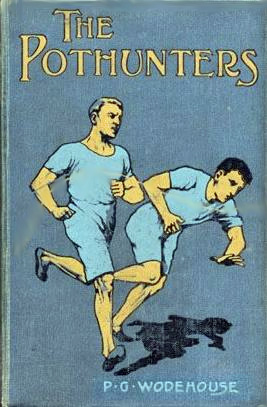
The Pothunters is a novel by P. G. Wodehouse published on 18 September 1902 by Adam & Charles Black. It was Wodehouse's first published novel, and the first of several school stories, this one set at the fictional public school of St. Austin's. It was originally published as a serial in the British magazine Public School Magazine from January to March 1902. An American edition was issued from imported sheets.

A Prefect's Uncle is an early novel by author P. G. Wodehouse, one of his school stories for children. It was first published on 11 September 1903 by A & C Black. An American edition was issued by Macmillan from imported sheets in October 1903.
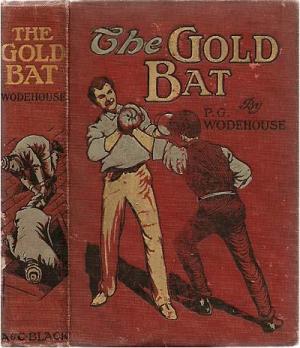
The Gold Bat is a novel by P. G. Wodehouse, first published on 13 September 1904 by A & C Black, London. It was originally serialised in The Captain.

Tales of St. Austin's is a collection of short stories and essays, all with a school theme, by P. G. Wodehouse. It was first published on 10 November 1903 by Adam & Charles Black, London, all except one item having previously appeared in the schoolboy magazines, The Captain and Public School Magazine.

Mike is a school story by P. G. Wodehouse, first published on 15 September 1909 by Adam & Charles Black, London. The story first appeared in the magazine The Captain, in two separate parts that were collected together in the original version of the book; the first part, originally called Jackson Junior, was republished in 1953 under the title Mike at Wrykyn, while the second half, called The Lost Lambs in its serialised version, was released as Enter Psmith in 1935 and then as Mike and Psmith in 1953. Although Mike was one of Wodehouse's earlier books, Wodehouse thought it his best work.
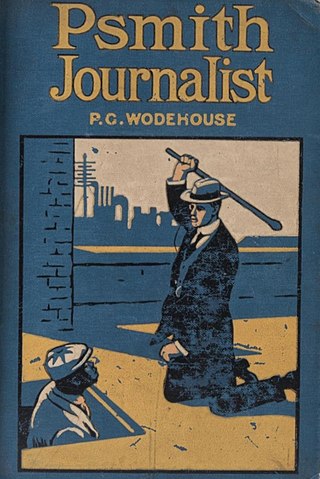
Psmith, Journalist is a novel by P. G. Wodehouse, first released in the United Kingdom as a serial in The Captain magazine between October 1909 and February 1910, and published in book form in the UK on 29 September 1915, by Adam & Charles Black, London, and, from imported sheets, by Macmillan, New York, later that year.

The Head of Kay's is a novel by English author P. G. Wodehouse. The novel was published on 5 October 1905 by A & C Black. The Head of Kay's was first published as a serial in The Captain from October 1904 to March 1905.
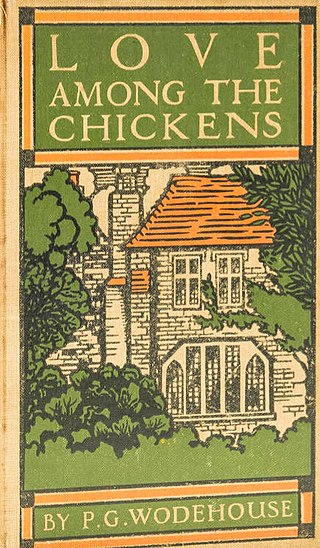
Love Among the Chickens is a novel by P. G. Wodehouse, first published as a book in the United Kingdom in June 1906 by George Newnes, London, and in the United States by Circle Publishing, New York, on 11 May 1909. It had already appeared there as a serial in Circle magazine between September 1908 and March 1909. The English edition was dedicated "to Sir Bargrave and Lady Deane"; the Rt Hon Sir Henry Bargrave Deane QC was a High Court judge and a cousin of Wodehouse's mother.

The Coming of Bill is a novel by P. G. Wodehouse. It was published as Their Mutual Child in the United States on 5 August 1919 by Boni & Liveright, New York, and as The Coming of Bill in the United Kingdom on 1 July 1920 by Herbert Jenkins Ltd, London. The story first appeared in Munsey's Magazine (US) in May 1914 under the title The White Hope.

Indiscretions of Archie is a novel by P. G. Wodehouse, first published in the United Kingdom on 14 February 1921 by Herbert Jenkins, London, and in the United States on 15 July 1921 by George H. Doran, New York.
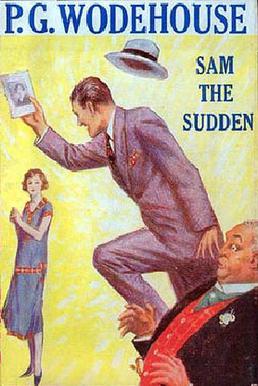
Sam the Sudden is a novel by P. G. Wodehouse, first published in the United Kingdom on 15 October 1925 by Methuen, London, and in the United States on 6 November 1925 by George H. Doran, New York, under the title Sam in the Suburbs. The story had previously been serialised under that title in the Saturday Evening Post from 13 June to 18 July 1925.

"The Debut of Battling Billson" is a short story by P. G. Wodehouse, which first appeared in the United States in the June 1923 issue of Cosmopolitan and in the United Kingdom in the July 1923 Strand. It features the irrepressible Stanley Featherstonehaugh Ukridge, and was included in the collection Ukridge, published in 1924.

"The Return of Battling Billson" is a short story by P. G. Wodehouse, which first appeared in the United States in the August 1923 issue of Cosmopolitan and in the United Kingdom in the September 1923 Strand. It features the irrepressible Stanley Featherstonehaugh Ukridge, and was included in the collection Ukridge, published in 1924.
"The Exit of Battling Billson" is a short story by British author P. G. Wodehouse, which first appeared in the United States in the December 1923 issue of Cosmopolitan, and in the United Kingdom in the January 1924 Strand. It features the irrepressible Stanley Featherstonehaugh Ukridge, and was included in the collection Ukridge, published in 1924.
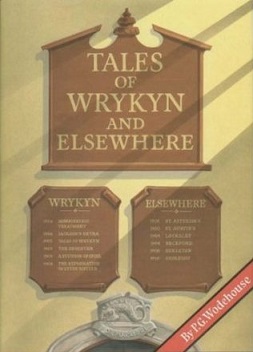
Tales of Wrykyn and Elsewhere is a collection of short stories by British writer P. G. Wodehouse, first published on 1 October 1997 by Porpoise Books, London, with illustrations by T. M. R. Whitwell. It contains previously uncollected work, most of the stories having first appeared in the schoolboy's magazines such as The Captain and Public School Magazine. It was reprinted by Penguin Random House under its Everyman's Library imprint in 2014.


















